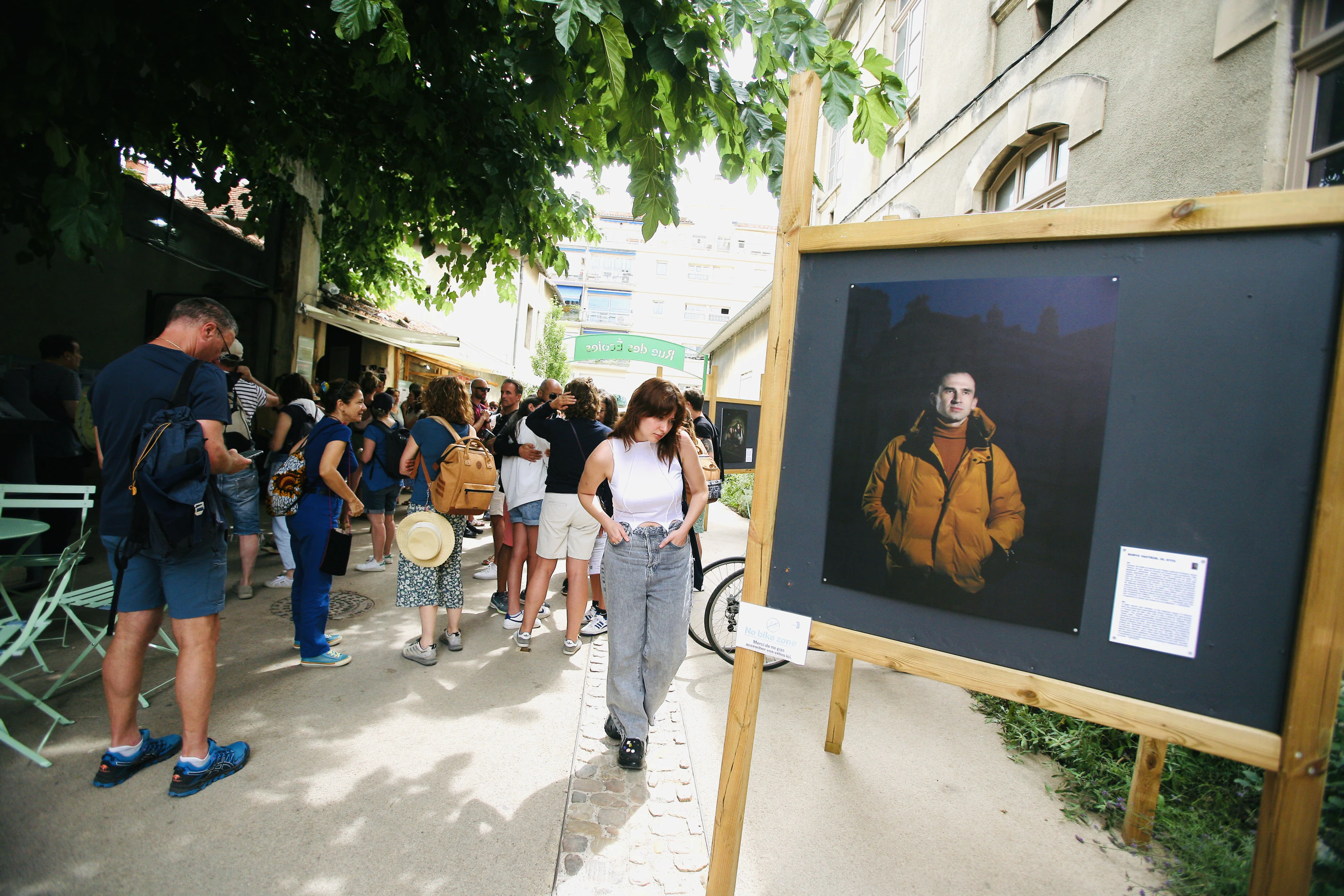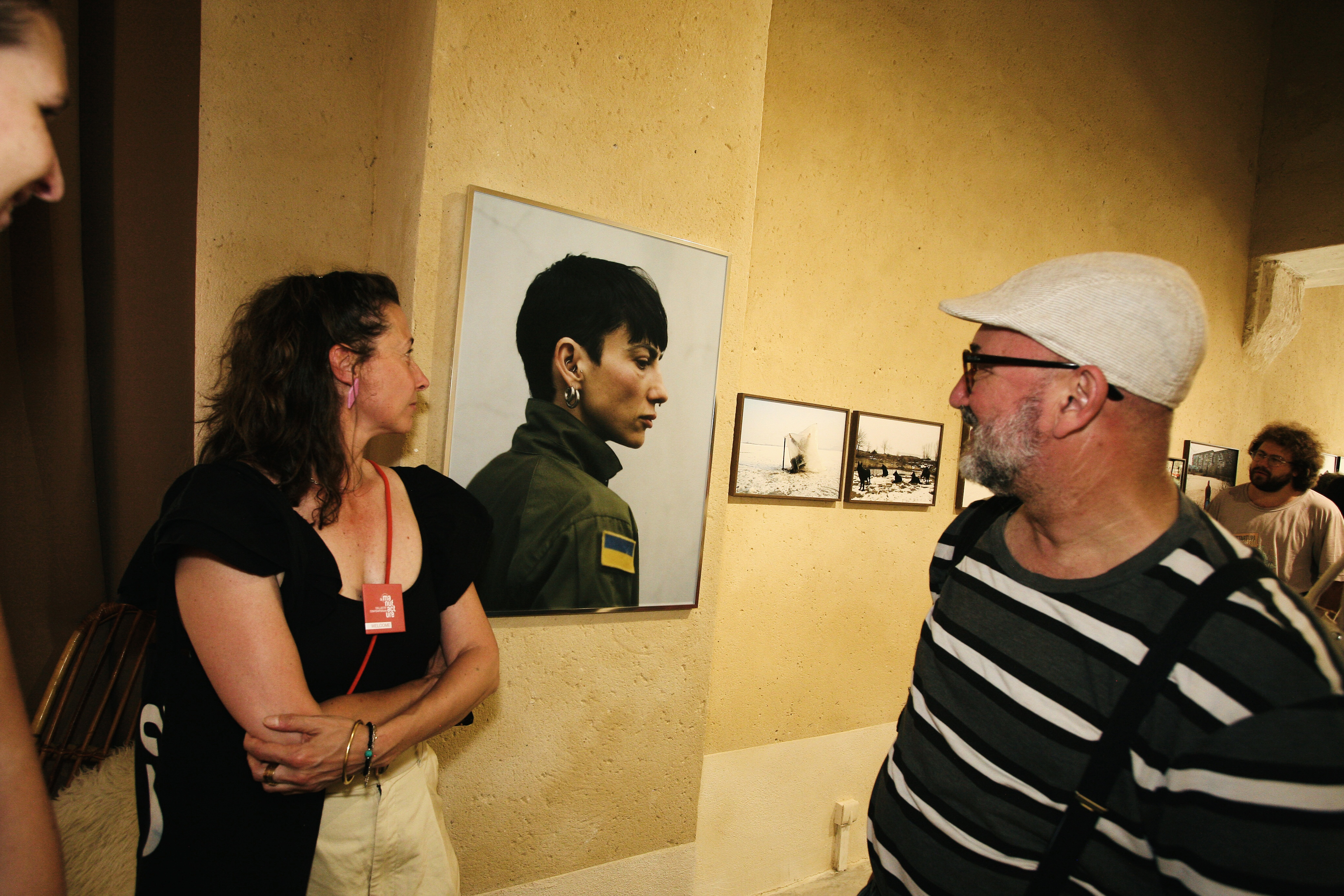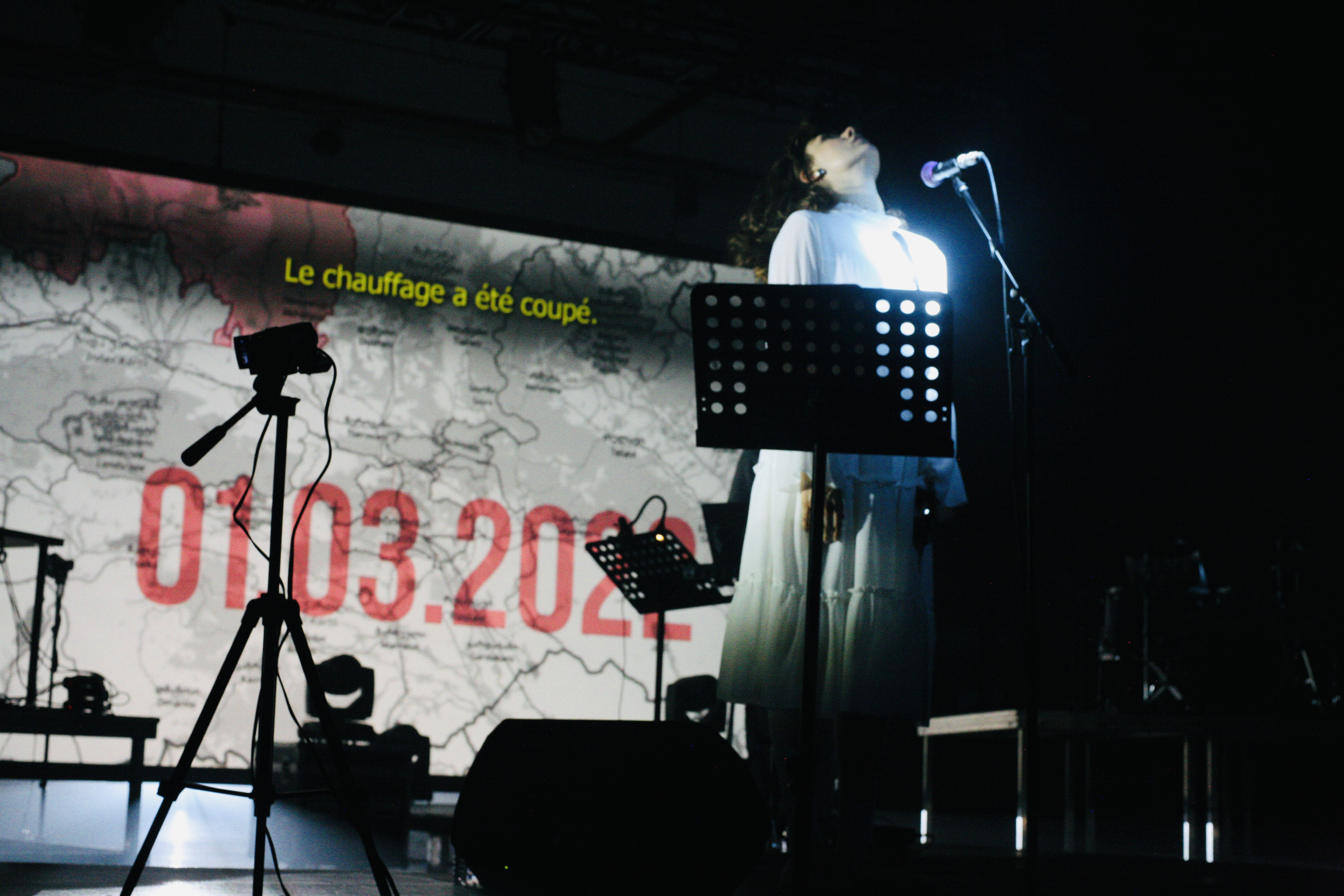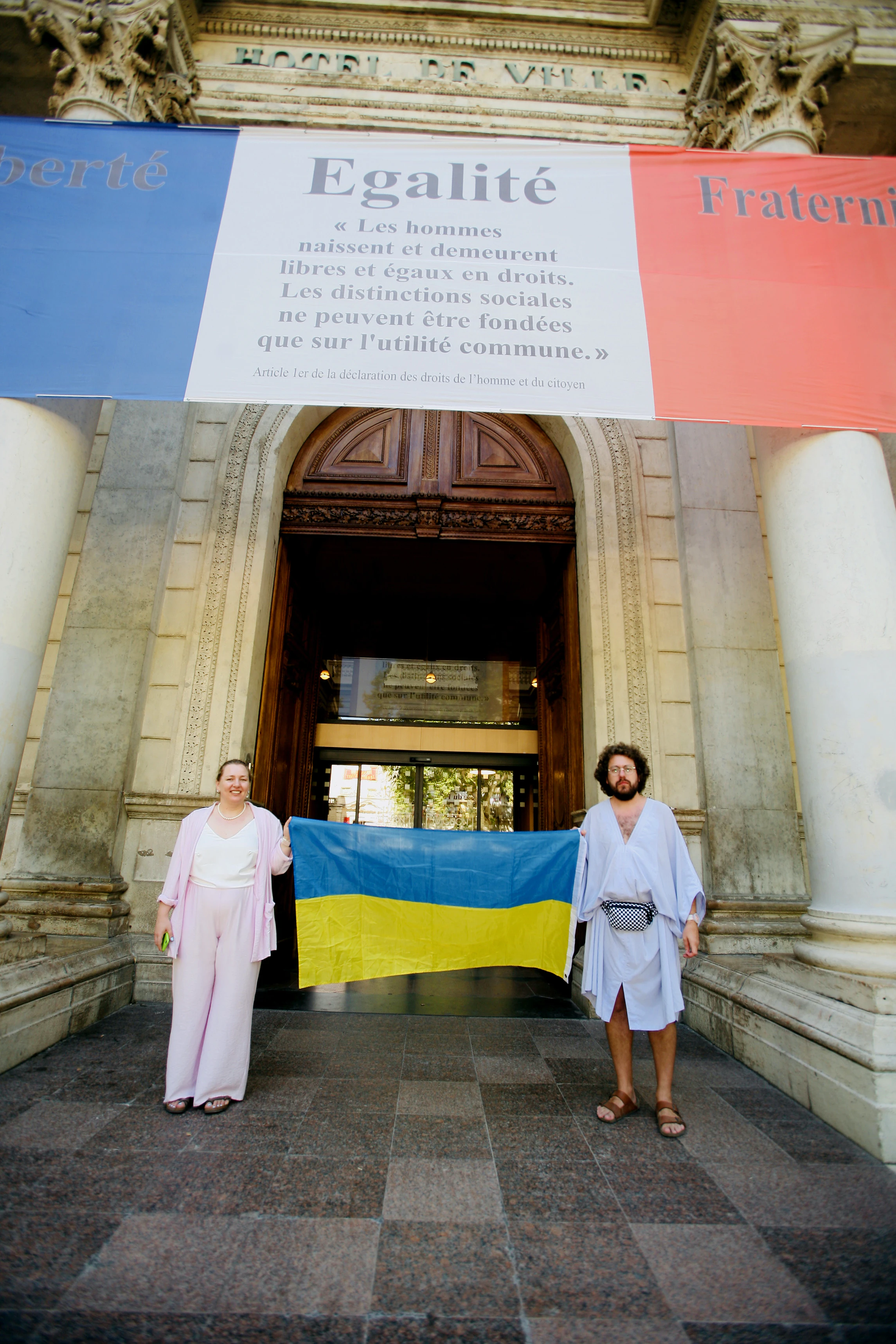ZMINA: Rebuilding | Pavilion of the Future: A Cultural Beacon Amidst Turmoil

The Pavilion of the Future, Ukraine 2024: With the Beating Hearts project, presented at the Avignon Festival in July 2024 as part of the ZMINA: Rebuilding programme, stands as a testament to the power of culture in times of adversity. Organised by La Manufacture in collaboration with the Ukrainian Institute in France, the project highlights the role of art in fostering resilience, preserving cultural identity, and strengthening European solidarity with Ukraine. The Pavilion’s events unfolded over several months, weaving together performances, exhibitions, peer meetings, and discussions that placed Ukrainian artistic expression at the heart of one of the world's most renowned theatre festivals.
Since the war began, Ukraine has battled not just on the front lines but also in the fight for its values, history, and cultural expression. The Pavilion project served as a symbolic space where Ukrainian artists could share their narratives, confront the tragedies of war, and envision a future beyond destruction. Through a curated programme, audiences had the opportunity to engage with works that challenged perceptions, evoked deep emotional responses, and showcased the incredible creative defiance of a nation under siege.
.jpg)
Beyond the festival itself, the initiative continued with a residency programme in November 2024, bringing together five Ukrainian artists, architects, and urbanists into a shared living and working space. This residency was designed not just as a retreat for artistic creation, but also as an immersive experience in which participants engaged with the concept of rebuilding and cultural reconstruction. They worked on a project for a community living centre while simultaneously exploring contemporary artistic practices in France.
The programme extended beyond their working space, taking the participants to Marseille and Paris, where they visited the La Fayette Foundation and spent time at La Wonder—a nonprofit residency centre in the Parisian suburbs, where they gained insight into how independent artistic communities function in France. Frédéric Poty, one of the project’s key organisers, explains the broader vision: “The idea was to show them architecture as a gesture, to expose them to how France approaches cultural spaces, and to offer inspiration for their work in Ukraine.”
A highlight of the residency was a discussion held at the French Institute in Paris, where the artists presented the outcomes of their residency and discussed the broader movement of rebuilding Ukraine. They shared their insights and research on the shelter they had been designing for Lukašivka village, aimed at providing refuge and creative space for children affected by war. This residency exemplified the Pavilion’s commitment to fostering long-term artistic exchange, ensuring that its impact extends far beyond a singular festival moment.
It is, as Frédéric describes it, “not just an artistic project, but a necessary intervention in the cultural and social fabric of Europe.” For him, the presence of Ukrainian voices in places like Avignon is crucial: “Europe cannot afford to be indifferent. Art is not separate from war; it is a battlefield in itself.” Frédéric underscores the importance of sustaining such initiatives beyond the festival:
These events should not be seen as temporary gestures of solidarity, but as essential components of a long-term cultural dialogue. We are not just supporting Ukraine; we are learning from it.
Fréderic Poty, one of project organisers
A Multifaceted Showcase of Ukraine’s Cultural Identity
The Pavilion’s exhibitions and performances weave a complex and deeply human story of survival and artistic defiance. One of the most striking aspects is its ability to shift perspectives, forcing audiences to confront not only the visible destruction of war but the less tangible wounds it leaves on identity, history, and cultural continuity.

The "From Inside" exhibition in La Petit Paradis gallery, for example, immerses visitors in the emotional and psychological landscape of today’s Ukraine. Through a powerful collection of photographs by four Ukrainian artists, the exhibition offers an intimate look at life in a country at war, presenting works that oscillate between despair and hope. These works are not about war in the way the West often imagines it. They are not just about bombs and ruins. They are about memory, about fear, about what it means to wake up every day in a reality where the future is uncertain.
The Ukrainian adaptation of "Caligula" is another remarkable component of the project, a performance that resonates far beyond its historical and literary context. Written by Albert Camus, the play takes on a new urgency in a contemporary setting where authoritarianism and resistance are not abstract philosophical debates but everyday realities. Frédéric Poty emphasizes its relevance: “Camus wrote about the dangers of absolute power, of madness justified by ideology. In today’s Ukraine, this is not an intellectual exercise—it is life and death.” The staging of the play, intense and confrontational, is not merely a commentary on history but a direct challenge to present-day indifference in Europe.

Another deeply affecting performance presented as part of the Pavilion was "Misto Marii: The Siege Diaries." This piece offers an unfiltered, harrowing perspective on life in Mariupol during the siege, constructed from first-hand accounts and diary entries of those who lived through it. The performance, both intimate and overwhelming, draws the audience into the claustrophobic and terrifying reality of survival under bombardment. “There is a temptation to turn war into abstraction when it’s distant,” Frédéric remarks. “But this performance forces us to look at it as it is—human, tragic, immediate.” Through powerful storytelling, "Misto Marii" not only commemorates the lives lost, but also serves as an act of defiance, ensuring their voices are heard far beyond Ukraine’s borders.
The theatrical piece "Olga and Sasha’s War Diary" presents an intimate portrayal of ordinary lives caught up in extraordinary circumstances. The stories are raw, personal, and deeply unsettling. Festival-goers come prepared to see suffering, but what they find is something more complex—resilience, humor, moments of absurdity. War is not a single emotion; it is a shifting, contradictory experience. This layered depiction challenges the simplistic narratives often constructed around war, moving beyond victimhood to capture the full breadth of human response to crisis.
Beyond these performances, the Pavilion featured a series of discussions, film screenings, and poetry readings, each providing further insight into Ukraine’s cultural response to the war. One particularly impactful event was a panel discussion featuring Ukrainian writers and intellectuals, who spoke about the role of literature in preserving national identity under siege.
Another highlight was the screening of the documentary film ‘20 Days in Mariupol’, capturing the everyday resilience of Ukrainians, from frontline medics to displaced families striving to rebuild their communities. The selection of the documentary was curated to emphasize not only the tragedy of war but the courage and determination of those who refuse to be broken by it, as Frédéric noted, “These are not stories of despair. They are stories of defiance, of people who refuse to let war define them.”
Through this diverse range of artistic expressions, the Pavilion offered a holistic portrait of Ukraine’s cultural landscape—one that is deeply scarred yet unyielding, fractured yet full of creative force. It challenged European audiences to move beyond passive sympathy and engage with Ukraine’s struggle on a deeper, more intellectual, and emotional level.
The Manifesto: A Call for Cultural Responsibility
At the heart of this project is La Manufacture, an independent theatre and arts venue in Avignon, committed to providing a platform for politically and socially engaged performances. Through its partnership with the Ukrainian Institute, La Manufacture has created a space where Ukrainian voices can be heard, ensuring that the artistic community plays a central role in shaping Europe's response to the crisis.
However, this process has not been without its challenges. Frédéric Poty does not shy away from pointing out the difficulties of bringing Ukrainian art to the European stage.
It is not enough to invite Ukrainian artists to perform. True solidarity means ensuring they have the resources, the visibility, and the recognition they deserve. To present a single Ukrainian piece is not engagement; that is decoration.
Fréderic Poty, one of project organisers
His words highlight the urgency of creating deeper, more sustainable collaborations that move beyond symbolic support. Frédéric is also critical of the European art scene’s tendency to compartmentalize the war as something distant and external. “There is a kind of fatigue setting in, a sense that Ukraine’s war is ‘their’ problem, not ‘ours.’ But culture does not operate in isolation. If we fail to integrate Ukraine fully into our artistic and intellectual landscapes, we are not just failing them—we are failing ourselves.” This sentiment underscores the Pavilion’s broader mission: to dismantle the illusion of separation and to reinforce the idea that Ukrainian culture is an integral part of Europe’s cultural and political future.
A crucial component of the Pavilion’s vision is the Manifesto, a bold statement advocating for the essential role of art in rebuilding Ukraine and reinforcing its place in Europe. The text, published in several French media outlets, serves as a rallying cry for cultural institutions, urging them to take active responsibility in amplifying Ukrainian voices.
The Manifesto declares, “Voices from Ukraine speaking about Ukraine. Bringing to life the everyday life of a country at war to touch the heart of every European: that's the responsibility of artists in Ukraine. […] It is the responsibility of artists in Ukraine to confront us with this reality, with the tragedies that occur and the courage that triumphs, with the humanity that resists and the hope that is reborn.”

It emphasises that cultural engagement should not be reduced to passive observation but must translate into tangible action—financial support, artistic collaboration, and structural inclusion of Ukrainian creatives in European networks. The document outlines a roadmap for a long-term commitment to Ukrainian culture, arguing that the integration of Ukraine into Europe must be cultural as well as political. It challenges European institutions to go beyond symbolic gestures and build sustainable frameworks that empower Ukrainian voices, ensuring they are not only heard but actively shape the continent’s artistic and intellectual landscape.
A Cultural Renaissance in the Making
The Pavilion of the Future is not just a moment in time; it is a catalyst. It asserts that culture is not a luxury in times of war—it is a necessity. As Ukraine continues its journey toward reconstruction and European integration, initiatives like this help lay the foundation for a cultural renaissance that redefines the role of art in shaping societies.
Reflecting on the artistic standard upheld throughout the Pavilion’s programme, Frédéric Poty states, “We brought high-level artistic quality with a strong message, and we managed to give it.” This balance between aesthetic excellence and urgent storytelling is what made the project so impactful. Each performance, exhibition, and discussion was not only an artistic statement but also an act of resistance, proving that even in the face of destruction, creative expression remains a formidable force.
Frédéric remains committed to deepening these exchanges. He plans to return to Ukraine, meet with colleagues, and explore further collaborations that can extend beyond festival stages and residencies.
This is just the beginning,” he says. “We need to be present, to listen, to create together. Ukrainian artists are showing the world something extraordinary. It is our responsibility to ensure their voices continue to be heard.
Fréderic Poty, one of project organisers
By providing a platform for Ukrainian artists, the ZMINA: Rebuilding program and La Manufacture with partners are not only preserving culture; they are actively shaping the future. And in doing so, they remind us all that in the darkest times, creativity remains a beacon of hope.
Author: Mária Beňačková Rišková
ZMINA: Rebuilding is a project co-funded by the EU Creative Europe Programme under a dedicated call for proposals to support Ukrainian displaced people and the Ukrainian Cultural and Creative Sectors. The project is a cooperation between IZOLYATSIA (UA), Trans Europe Halles (SE) and Malý Berlín (SK).